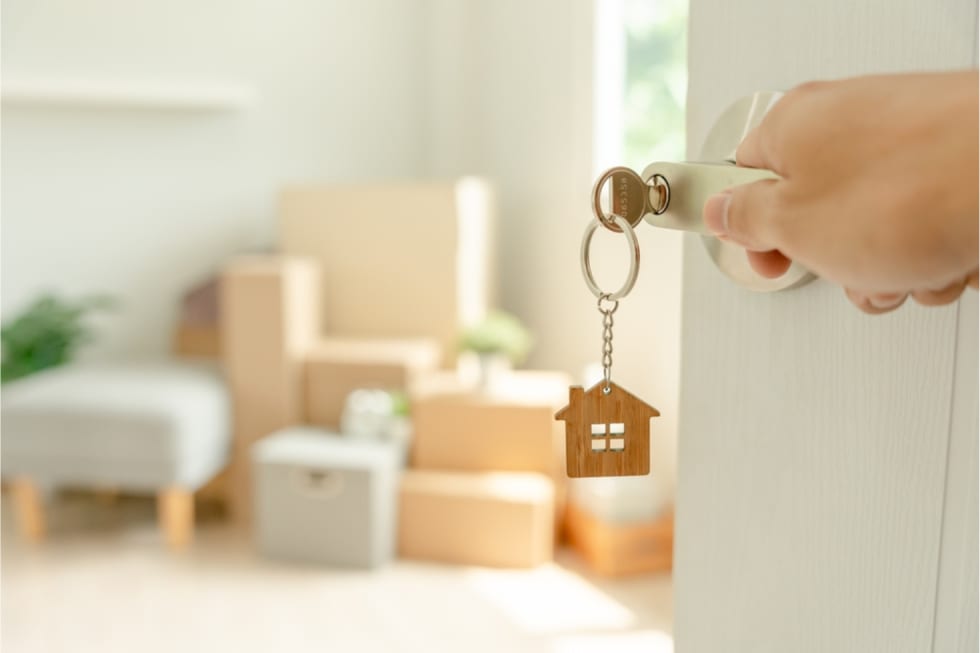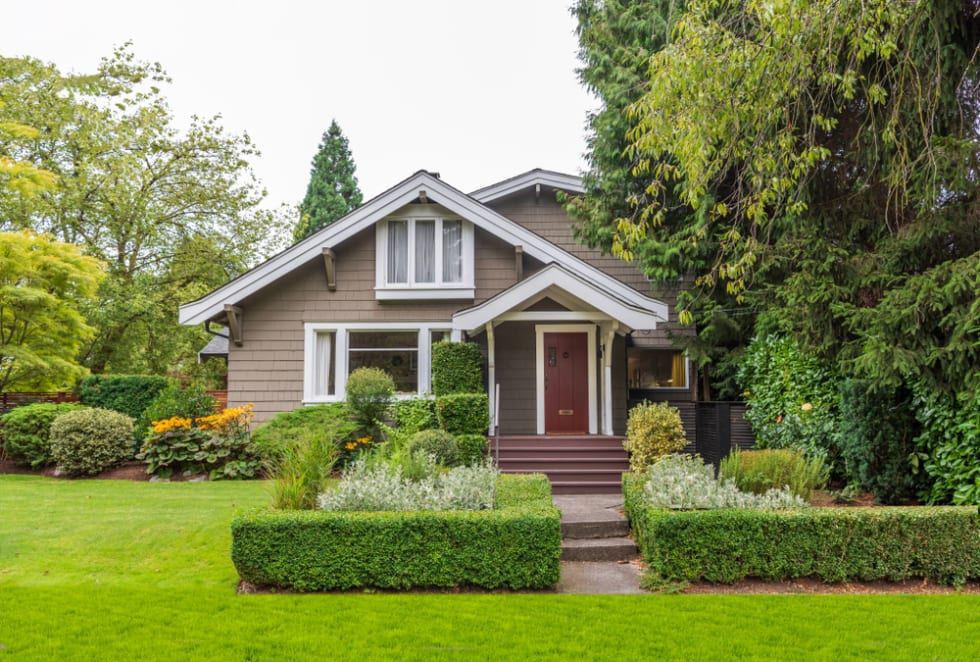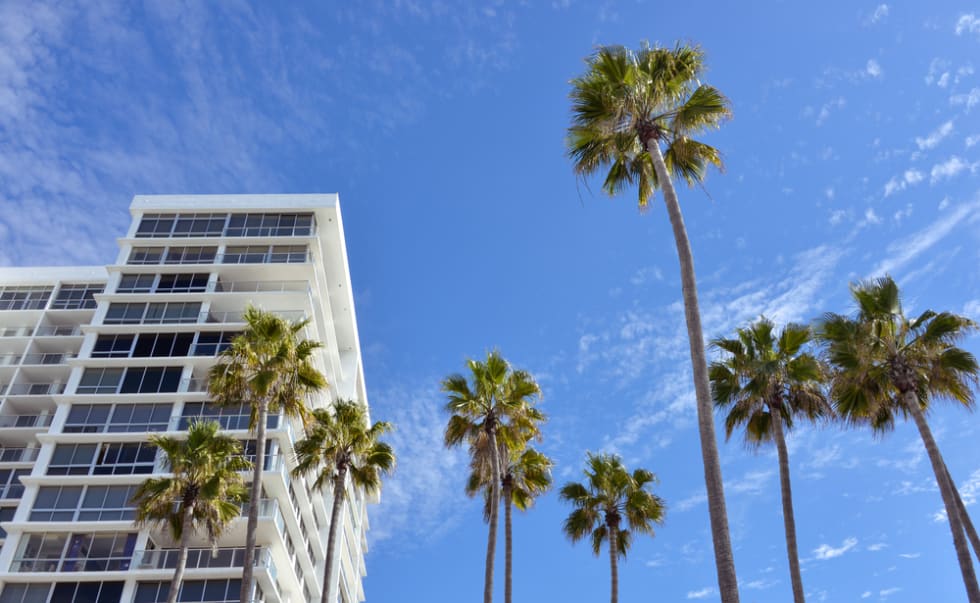- 46 units available
- 1 bed • 2 bed • 3 bed
- Amenities
In unit laundry, Hardwood floors, Dishwasher, 24hr maintenance, Stainless steel, Walk in closets + more

To figure out whether renting an apartment or a house is right for you, start by looking at your budget, lifestyle, and long-term plans. If saving on move-in costs and avoiding maintenance headaches are priorities, an apartment may be the better fit. But if you’re craving more space and privacy, a house could make more sense.
The reality is, there’s no wrong answer here. Both houses and apartments can be great rental options, depending on what you need. While they share similarities, there are some key differences between home and apartment rental to keep in mind.
If you’re torn between the two, let’s break down the pros and cons of renting an apartment vs. a house, where to find them, and how to choose the best fit for your situation.
The biggest differences between renting an apartment and renting a house usually come down to cost and convenience. Apartments tend to be cheaper overall, while houses provide more space but often come with higher expenses, unless you’re splitting costs with roommates.
Apartments are often located in more urban, walkable areas, with amenities like gyms, pools, and shared workspaces built right into the property. Houses, meanwhile, are more commonly found in suburban or residential areas, which might mean driving to work, the grocery store, or the gym.
That said, it’s not always so clear-cut. There are plenty of houses available in walkable city neighborhoods, and some apartments sit in quieter, suburban pockets. As you weigh your options, focus on your priorities—whether that’s space, location, convenience, or flexibility.

Renting an apartment comes with both perks and trade-offs. Some renters love the built-in amenities and lower costs, while others struggle with noise or limited space.
| Pro | Why It’s a Win |
|---|---|
| Less expensive | Rent and utilities tend to be cheaper when renting an apartment. |
| On-site amenities | Pools, gyms, community spaces, and pet areas are outside your door. |
| Walkability | Many apartments are near shops, restaurants, office buildings, and more. |
| Flexibility | Easier to move in and out, especially with shorter leases. |
| No maintenance responsibility | On-site staff handle repairs and maintenance. |
| On-site security | Some buildings have gated entry, cameras, or security staff. |
If you’re living solo or with just one roommate, an apartment is often the most affordable choice. Utilities tend to cost less too, since you’re heating or cooling a smaller space.
Many apartment buildings offer on-site amenities, including pools, outdoor areas, working stations, pet areas, gyms, covered parking, and wireless internet. Your particular apartment may even have an in-unit washer and dryer and a balcony for personal outdoor space.
Apartments are often built in areas where you can walk to coffee shops, stores, or restaurants. If you’d prefer to ditch your car for most errands, this is a big plus.
Moving between apartments is usually less of a hassle than moving houses. If your lease ends or you need to relocate for work, it’s generally easier to pick up and go, especially if you’re renting a fully furnished apartment.
Most apartment complexes have staff on-site that take care of everything: leaky faucets, landscaping, or a broken washing machine.
Some apartment complexes offer enhanced security features like gated access, surveillance cameras, and 24/7 security personnel.
| Con | Why It’s a Drawback |
|---|---|
| Noise | Thin walls mean you’ll hear neighbors, traffic, or construction. |
| Minor inconveniences | Issues like odors or leaks from other units are out of your control. |
| Lack of space | Smaller floorplans calls for better organization and more compromise. |
| Parking | Designated parking or not, it can be a hassle to get to and from your place to your car. |
| Limitations | Landlords may say ‘no’ to pets, painting, or DIY home projects. |
Sharing a wall with others means noise is unavoidable. You won’t know who your neighbors will be, and depending on the construction and insulation of the apartment, things can get pretty loud.
Weird smells? An unattended leak from your upstairs neighbor? These kinds of issues can have an effect on your space, and in an apartment, there’s a lot that’s out of your control.
A smaller space makes hosting a bit of a challenge, and can even make living feel a bit claustrophobic—especially if you own a lot of stuff. Keeping your place tidy and organized is key.
Street parking can be stressful in dense areas, even if your building offers designated spots. Carrying groceries up flights of stairs adds another layer of hassle.
Many apartment leases restrict what you can do with the space, from painting walls to keeping pets. Always check the rules before signing.

Renting a house comes with benefits like space and privacy, but the additional responsibilities might be a deal-breaker.
| Pro | Why It’s a Win |
|---|---|
| Shared expenses | Splitting rent and utilities among roommates lowers costs. |
| More space | Extra bedrooms, a yard, and garage make the place feel more homey. |
| Privacy | More distance from neighbors means a little more peace and quiet. |
| Personal freedom | You have more space and privacy to do what you want. |
| Family-oriented | There’s more room for kids and pets to spread out and play. |
If you’re renting a home with a lot of people, it can actually end up being less expensive than renting an apartment. Typically, the more roommates, the less everyone will need to pay. If you like the idea of living with a larger group of people, you may even consider co-living.
A house offers more room for guests, pets, and furniture. You can turn that extra bedroom into a home office, use the outdoor area to host more BBQs, and use the garage as extra storage.
One of the biggest advantages of renting a house is privacy. You’ll physically be further away from your neighbors than in an apartment, so noise complaints are usually minimal.
Hosting friends, playing instruments, or working out at home is easier when you’re not worried about disturbing the person next door.
Renting a home is great for families. You’ll have more room for your kids to spread out and play without disturbing the neighbors. And if you have a pet, you’ll likely have a yard for them to roam around, too.
| Con | Why It’s a Drawback |
|---|---|
| More upkeep | Yards, snow removal, and larger spaces mean more chores. |
| Higher costs | Rent and utilities can be more expensive with fewer roommates. |
| Convenience | Most homes for rent are further from urban centers. |
If you rent a house, more chores are pretty much a given. Plus, there’s yardwork—and if you’re in a snowy climate, you’ll likely have to stay on top of snow removal, too. Daily upkeep is key to keep chores from piling up.
A bigger space usually comes with higher rent and utility costs, especially if you aren’t splitting these costs with roommates.
Most homes for rent are located in suburban areas, often further away from shops, restaurants, and other activities.

Finding a house for rent might take more work than an apartment, but the process can be worth it. Here are nine expert tips from the the Apartment List team to help you in your search:
Before you start looking, know what you can realistically spend on rent. Experts often recommend that your rent shouldn’t exceed 30% of your monthly income.
Make a list of what you need in a rental home, like the number of bedrooms, bathrooms, and any special features like a pet-friendly policy or accessibility for disabilities.
Look for areas that match your lifestyle and needs. Consider factors like safety, proximity to work or school, public transportation, and local amenities like parks, shops, and restaurants.
Stay on top of new listings that match your criteria by turning on alerts from listing sites. At Apartment List, our real-time alerts keep you in the loop of price changes, availability, and new units.
Landlords will typically ask for identification, proof of income, rental history, references, and possibly a credit report, so make sure you have your documents ready to go.
Check everything with a fine-tooth comb: everything from appliances, plumbing, and outdoor areas during your tour.
Pay attention to terms regarding the deposit, rent increases, lease renewal, and termination conditions.
Don’t be afraid to negotiate the rent, lease terms, or amenities with the landlord.
Consider how long you plan to stay and whether the home will still fit your needs down the road.
Finding a home for rent is easier than you would think. There are many online platforms available to help you find a home.
The list below details some of the best online platforms to help you find a home to rent.

The best time to rent an apartment depends on what you’re looking for. If you want to save on your apartment, try renting during the winter months when rent prices and competition are generally lower. Hiring movers should be pretty easy, too, since fewer people move during the winter.
If you want to choose from a wider selection of apartments, start your search during the summer months when the moving season reaches its peak.
Seasonality in the rental industry is pretty predictable, so it’s not hard to tweak your strategy to get the most out of your apartment search.
Choosing between a house and an apartment depends on your lifestyle and priorities. A house is often the better fit if you need extra space for family, pets, or hobbies, or if you want more privacy and the feel of suburban living. Renting a house can also help you prepare for the responsibilities of homeownership, though it usually comes with higher costs and more upkeep.
Apartments, on the other hand, tend to be more affordable and convenient. They’re often located in walkable neighborhoods with easy access to shops, restaurants, and public transit. Amenities like gyms, pools, or coworking spaces are an added bonus, and with on-site staff handling maintenance, you’ll have fewer responsibilities on your plate.
Neither option is necessarily “better” because it all comes down to what you value most. If you’re still unsure, start by listing your must-haves and dealbreakers, then see which type of rental lines up. And if you want a shortcut, take Apartment List’s personalized quiz to get matched with homes and apartments that fit your needs.
Apartments are typically cheaper in terms of rent and utilities. Houses can be affordable if costs are split among roommates, but renting a house alone is almost always more expensive.
Houses usually offer more bedrooms, outdoor space, and privacy, making them the better option for families. Apartments may work if you prefer city living or want access to amenities like pools or playgrounds.
It depends on the neighborhood. Apartments may offer additional security features like gated access or cameras. Houses often rely more on personal security measures like alarms and locks.
Most apartments have an on-site office or online portal where you can submit maintenance requests. In houses, you’ll usually need to contact your landlord directly.
It varies. Some apartments include parking in the rent, while others charge extra for garages or reserved spaces. Always confirm before signing.
Not always. Some luxury apartments may include Wi-Fi, but most renters are responsible for setting up and paying for internet service.
Yes, if you want more space than an apartment but don’t want the upkeep of a full house, a townhouse is the perfect middle ground.




In unit laundry, Hardwood floors, Dishwasher, 24hr maintenance, Stainless steel, Walk in closets + more
In unit laundry, Granite counters, Pet friendly, Stainless steel, Walk in closets, Gym + more